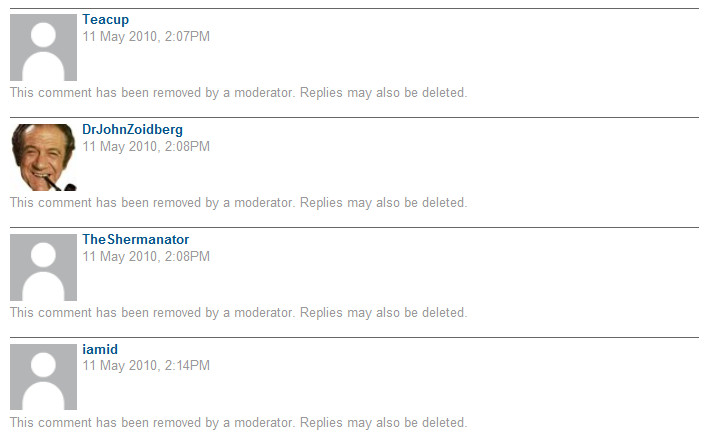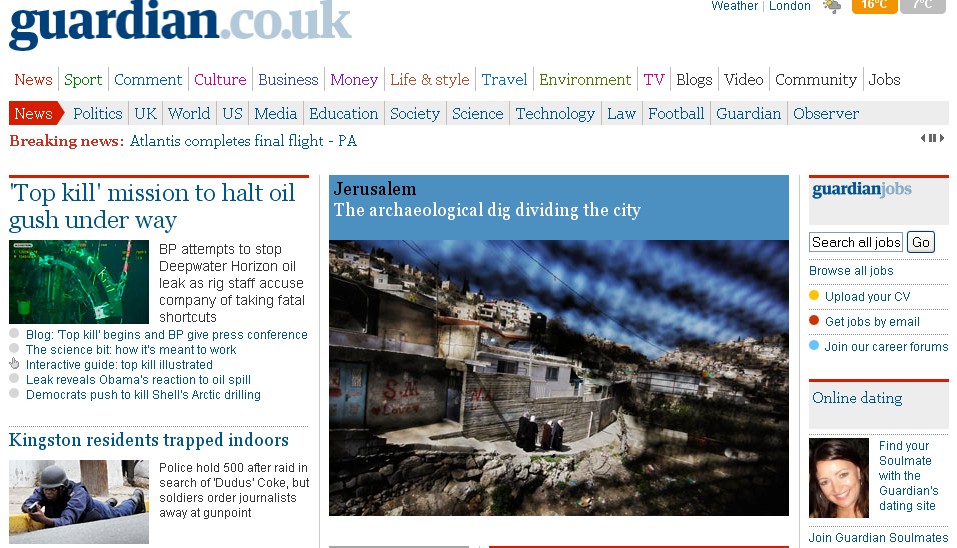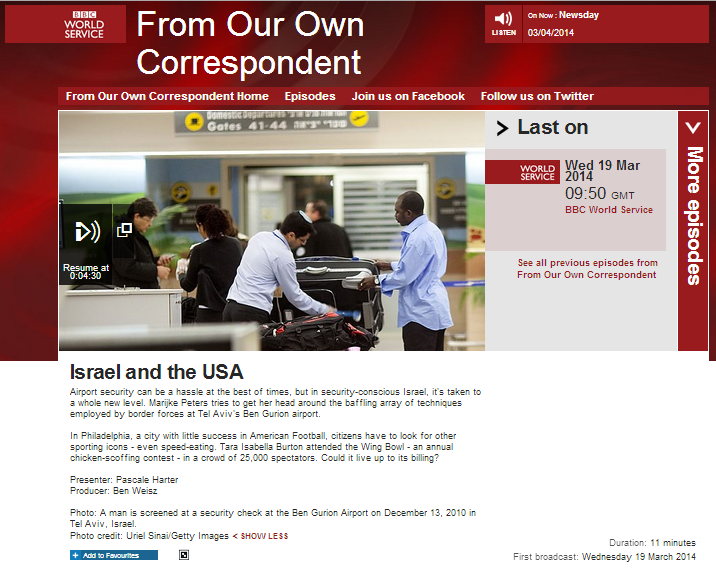AL: I was struck by your passage about how the “mythical Israel” has gained traction beyond Islamist circles. You describe this mythical place as “a place of uninterrupted darkness and horror, in which every human interaction is ugly, crude, racist, brutal.” In our work at CiF Watch, we’ve also noted how such a caricature has taken root among the UK intelligentsia, a dynamic which informs much of the reporting, and commentary, about Israel at the Guardian. Do you have any insights as to how otherwise intelligent and sober minds can so easily accept such a facile and distorted picture of Israeli life – one which is unrecognizable to those who actually live here?
JS: Well, having just returned from a trip to the UK, I think one of the reasons for this is because of the sheer volume of copy and programming hostile to Israel which an average, intelligent consumer of media and TV in the UK would come across and be exposed to – compared to a near absence of anything much proposing an alternative view. In the week I was there, there was ‘The Promise’ – an extremely bizarre but very professionally made saga about the last years of the British Mandate, which managed to depict the 1947-8 period as a sort of attempt by hapless and nice Brits and Arabs to resist the onslaught of crazed Zionist immigrants damaged by the Holocaust. Then there was ‘War child’ about children in Gaza, and also a documentary about settler extremists. I’m not sure if this was an especially busy week! Now, in contrast to this, as a Middle East analyst, in the past I’ve also been struck by the near silence in the British discussion concerning the brutal nature of many regional regimes.
AL: You mention the strength of radical Islam in the UK, and recounted your experiences as a student there in the 90s interacting with adherents to this movement. Why, in your view, has the UK shown to be so much more fertile ground for Islamism, as opposed to, other European countries or the United States?
JS: I don’t know the answer to this, as I’m less familiar with the US situation, but I would counsel against any nation feeling satisfied with its performance in this regard. Off the top of my head, the US produced Anwar al-Awlaki, and Nidal Hassan, so I don’t think this represents a shining success. If one is to adopt a strictly empirical approach, the nation with the most ‘success’ in this regard is France, which has yet to suffer a major Islamist terror attack on its soil committed by home-grown terrorists. As I said, I don’t think anyone should feel smug. But its maybe worth noting that the French system combines an absolute, ruthless lack of tolerance toward foreign Islamist preachers and their activities on french soil (in marked contrast to the UK), with a very sophisticated intelligence community, which has for a long time included lots of people with regional languages and knowledge. I think everyone can see why both these things are good assets to have.
AL: As a new Israeli, I was especially moved by your characterization of Israel’s resiliency, adaptability, and – despite its relative affluence – her capacity, in your view, to understand and respond to the present and future challenges by Islamism (The Muqawama). However, throughout the book, you also understandably expressed concerns about our capacity to resist this threat so, I’d like to know what currents in Israeli political, social, or intellectual life you think could possibly erode this capacity to resist the Islamist threat. For instance, in the late 90s, Yoram Hazony, in his book “The Jewish State“, suggested that post-Zionist thought represented a clear intellectual (existential) threat to the state. Is there a dynamic in the current Israeli political context which particularly worries you?
JS: Yes, I am concerned at the withdrawal from politics of many of Israel’s ‘best and brightest.’ Israel produces excellence in many fields. But it is very noticeable that the young leaders in the most dynamic parts of the private sector tend to shy away from political activity and to some degree from public engagement. I think we need to find a way to change this. Also, I am worried by the state of Israel’s education system, and the performance of Israeli kids today relative to other countries in crucial subjects such as math and English. Israel has been able to thrive because of its edge in the field of knowledge. It’s vital that this edge is not lost. And we can’t afford to have only small islands of world-class excellence in a sea of mediocrity. That isn’t going to cut it, given the nature of the challenges we face.
AL: Before reading your book, I was intrigued by the subtitle: “The Rise of the Israeli-Islamist Conflict”. After finishing it, however, I now see that it’s a much more accurate characterization than the terms typically used, like “Israeli-Arab Conflict” or “Israeli-Palestinian Conflict.” Can you expand a bit on the significance of this subtitle, and why you think its important to frame the conflict in such terms?
JS: The term isn’t mine. Martin Kramer came up with it. And I liked it so much that I decided to annex it (thanks, Martin). But first and foremost, the point is that this term is more accurate, because the main enemy in the axis now facing Israel – Iran – is not an Arab country, so the old terms wont do. Iran has also succeeded in splitting the Palestinian national movement, and arguably one half of that movement (the Ramallah Palestinian leadership) is not aligned against Israel in the current conflict – or at least it is certainly not allied with Iran so there is a clear need for a new term. Also, of course, the new anti-Israel axis is characterized by the fact that it consists almost exclusively of forces bearing allegiance to one or another form of political Islam. So I think the term is an accurate and descriptive one.
AL: Your account of the battle your IDF armored unit was engaged in during the 2nd Lebanon War was quite gripping. I’ve read other accounts by IDF soldiers and officers who described one of the military advantages of the IDF – beyond its weaponry, training, and preparedness – as a culture which encourages improvisation and initiative, and indeed empowers personnel to adapt to new military circumstances and even abandon a plan of battle if the circumstances warrant it. From your experiences, is that a fair characterization of the IDF today?
JS: Flexibility, willingness to improvise, independence of thought – all these characterize the Israeli at his/her best, certainly. At their worst, these can exhibit themselves as failure to engage in proper planning, failure to prepare and over-confidence. So I think that when our army does well, it’s because it manages to turn the Israeli mentality toward the former, rather than the latter. I sincerely hope that recent re-focusing in the military will produce the right results the next time around. I think that from a purely military point of view, certainly from my layman’s eye, the signs emerging from recent campaigns and activities appear mixed.
AL: Regarding the political upheavals in Egypt, and Yusuf al-Qaradawi’s return to the country, how would you assess the chances of the Muslim Brotherhood gaining political power there? And, in the context of Egypt’s previous role (under Mubarak) as part of the anti-Iranian block of Arab states, are you concerned that, even if the MB doesn’t take power, they may break out of this alliance, and move closer to Iran and Syria?
JS: I think there is a very high chance that the Muslim Brotherhood will play a major role in Egyptian politics in the future. This does not mean that the movement will ‘seize power’ or will emerge as the sole ruler of Egypt. Rather, it will probably perform well in elections and emerge as one of the lay power brokers in the country. This could well have the effect of moving the country away from its past role as a lynchpin of the western strategic architecture in the Middle East. It doesn’t mean that Egypt will align with Iran and Syria. For economic reasons the country will have much motivation to remain aligned with the US. But it does mean that a more volatile and uncertain picture could emerge.
AL: Finally, are there any other writing projects you’re planning for the future?
JS: Well I am currently planning some articles on the Syrian opposition, where I have some interesting friends and contacts. I’d also like to write a book on the reasons for the relative success enjoyed by the Iranian (or IRGC) political-military model in certain areas of the Mid-East in the last years – specifically in Lebanon, among the Palestinians and in Iraq. This success has taken place despite Iran’s economic backwardness and the not especially sophisticated nature of their model. So this is something which it is worth looking at. Of course, there are those who are saying that the current unrest in the Arab world will put paid to that success. I’m not convinced. We’ll see.




